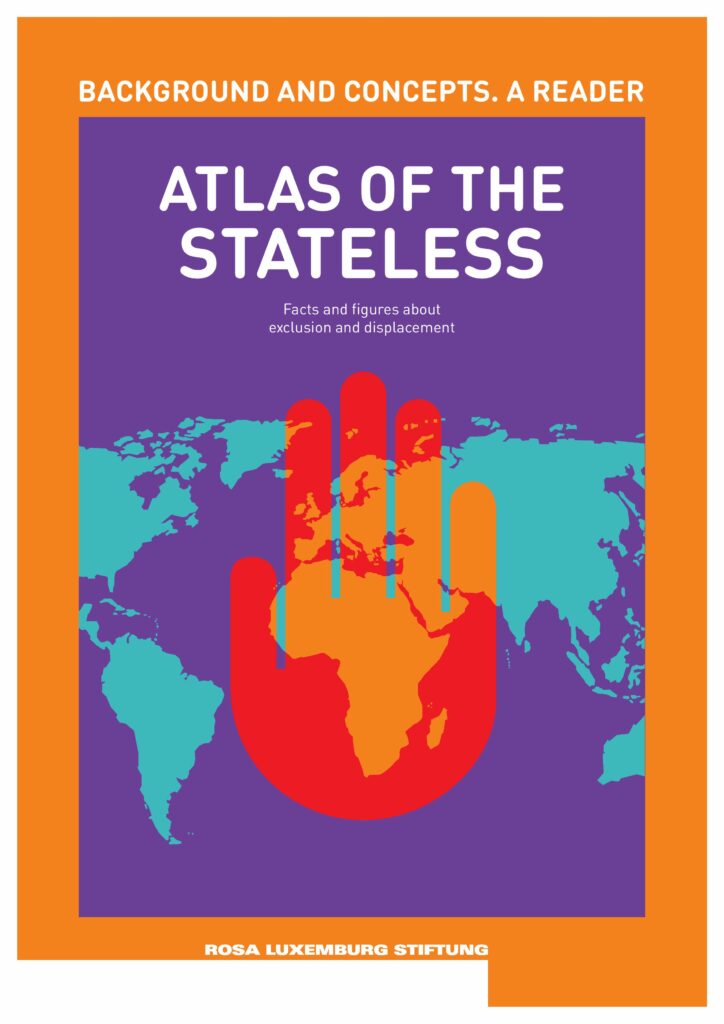Share Twitter Facebook Email Copy URL
In the United States, two powerful myths – a person’s birthplace and their ancestry – are the basis of citizenship, of being an American. For immigrants, though, U.S. citizenship law is fraught with injustices and dangers.

Stephanie DeGooyer is an Assistant Professor at the University of North Carolina at Chapel Hill. Her research focuses on intersections between transatlantic literature, law, and political philosophy, especially with regards to citizenship and immigration.
The article was published in the Reader to the Atlas of the Stateless which is available in English, French and German.
On May 6, 2019, Archie Harrison Mountbatten-Windsor was born in a private London hospital to an American mother (Meghan Markle) and an English father (Prince Harry). Archie came into this world seventh in line to inherit the English Crown. He also came into the world the first member of the Royal family to be a citizen of both the United Kingdom and the United States. Importantly, however, at his birth, Archie became not only a citizen of the United States, he became a “natural born” citizen. This is the status first mentioned in Article II, Section 1 of the U.S. Constitution, which stipulates that “No Person except a natural born Citizen, or a Citizen of the United States, at the time of the Adoption of this Constitution, shall be eligible to the Office of President.”
Baby Archie could thus grow up to be what America’s founding fathers feared most: an English prince as president. In recent years, however, the “natural born” clause has been the subject of different preoccupations. During the 2016 debates for the Republican Party presidential nomination, for example, Ted Cruz and Donald Trump squared off on the issue of whether Cruz – who was born in Calgary, Canada, to an American mother and a Cuban father – was eligible to be president. Trump argued that the framers of the Constitution had the principle of jus soli (right of the soil) in mind when they wrote that a president had to be a “natural born” citizen. In response, Cruz argued that he was “natural born” according to another principle of nationality, the principle of jus sanguinis (right of blood), which awards citizenship on the basis of a biological connection to an American citizen.
Most constitutional lawyers agree with Cruz’s interpretation. Although natural birth seems to be premised on the territory in which an individual is born, according to a 2011 report from the Congressional Research Service, there are three ways that individuals can claim the status in the United States: “either by being born ‘in’ the United States and under its jurisdiction, even those born to alien parents; by being born abroad to U.S. citizen-parents; or by being born in other situations meeting legal requirements for U.S. citizenship ‘at birth’”. To be “natural born”, a person must have a biological attachment to the United States, whether through the physical location of their birth or the body of a parent.
The pertinence of “natural born” status is not limited to the highly select people who run or consider running for president every four years. “Natural birth” has an everyday purchase on the American populace, splintering citizens into two groups: natural citizens who claim citizenship as an automatic right and naturalized citizens who passively receive citizenship as a gift. This distinction became palpable recently when Trump tweeted that four female congresswomen of color should “go back” to where they came from. Many news reports rushed to point out that three of the four women were born in the United States. That difference set the fourth congresswoman, Rep. Ilhan Omar, apart. As a naturalized citizen – born in Somalia – Omar becomes distinct in the American psyche not merely, because she applied for citizenship, but because the biological definitions attached to birthright make her unnatural.
Consider the case of another baby born in London the same year as Archie. This child was born via surrogate to a male same-sex couple from the United States. The baby’s parents were married and both were U.S. citizens, though one of the parents – crucially, the sperm-donating parent – was originally born in Britain. Shortly after the birth, the U.S. State Department issued a letter informing the couple that their child was not a citizen of the United States at birth. The parent with a genetic attachment to the child had not lived long enough in the United States as a citizen to pass his citizenship down (five years is the minimum). The other parent, who was a natural born citizen, could not establish a “blood connection” to the child. Thus, according to the principles of jus soli and jus sanguinis, the child was an alien to the United States.
Baby Archie could thus grow up to be
what America’s founding fathers feared
most: an English prince as president.
Why is it that a child born to a British princess who will likely never again live in the United States has a right to U.S. citizenship, while a child born to two U.S. citizens must apply for a tourist visa to visit its parents in the United States? Why is it that a crowd will chant “send her back” about a U.S. congresswoman? On what moral and historical ground is birth a more meaningful register of civic attachment?
These questions became particularly pressing after Trump declared in an interview with “Axios on HBO” that he would sign an executive order to end birthright citizenship in America. “We’re the only country in the world”, Trump insisted, “where a person comes in and has a baby, and the baby is essentially a citizen of the United States […] with all of those benefits.” (This is not correct: more than thirty other countries maintain a policy of birthright citizenship.) Trump vows to end birthright citizenship for the same reason that he wants to build a wall and separate families at the border: to stop the “invasion” of immigrants at the southern border (and rally his base in preparation for the next election). Defence of birthright at this moment thus joins wider resistance against Trump’s xenophobic policies.
Today, the law devised to help former slaves
after the abolishment of slavery, protects the
children of undocumented immigrants.
Historically, as many people have recalled, birthright was introduced to protect vulnerable populations in the United States, namely freed slaves after the abolishment of slavery. Today, the same law devised to help former slaves protects the children of undocumented immigrants. If we care about just citizenship practices, it makes sense that we would want to continue to uphold birthright.
It is true that birthright citizenship offers protection for U.S. born children of immigrants. But it is also true that this right does nothing to protect the parents of these children or any siblings brought to the United States as young children. Birthright citizenship is stopgap citizenship; it helps some people, but the very principle of birthright is the source of inequality for many others. Fairer and more just practices of citizenship require abolishing the distinction between natural and naturalized citizens under law. This does not mean that citizens do not acquire citizenship when they are born in the United States. Instead, it prevents the arbitrary factor of birth from carrying protections and allowances unavailable to naturalized citizens.
Of course, citizenship is fundamentally a form of division and inequality. Borders are in themselves a massive source of inequality, reserving resources and benefits for those considered “insiders”. Today many on the left are calling for open borders, a proposition that involves, among other things, the expansion of sanctuary protections for migrants and the erosion of territorial definitions of national membership. It is not entirely clear to what extent the realization of open borders requires the overthrow of citizenship and revolutionary dismantling of the global nation-state system. As long as there is a constitutive “we” that defines the people, citizenship will continue to formalize privileged membership. Which is why we need to ensure that more people can access its protections. One powerful, and maybe even bipartisan, way of doing this would be to eliminate the distinctions that conceive of birth as a preeminent form of national belonging.
For much of the early history of the United States, birth was actually a secondary source of citizenship. The 1790 United States Naturalization Law, which first laid out the rules for national citizenship, limited citizenship to immigrants who were free white persons of “good character”. Native Americans, slaves, free blacks, and indentured servants were all prohibited citizenship. State and federal tribunals argued that Indians, though born within the territorial limits of the United States, could not be citizens because they were born with allegiance to their tribes, which were alien to U.S. law. The counsel from the 1823 case Johnson vs. McIntosh held that native Americans were “not citizens, but perpetual inhabitants, with diminutive rights”. Free blacks born in the United States were also excluded from citizenship because Southern courts argued, paradoxically, that birth did not make a citizen; entitlement to rights and privileges did.
After the Thirteenth Amendment abolished slavery, Congress passed the Civil Rights Act in 1866 to guarantee the citizenship of freed slaves. “All persons born in the United States,” it read, “and not subject to any foreign power, excluding Indians not taxed, are hereby declared to be citizens of the United States.” To protect this new view of citizenship and to make citizenship a national rather than state mandate as it had been, Congress then approved the Fourteenth Amendment. In 1868, Section I of the Fourteenth Amendment was added to specify the conditions of citizenship: “All persons born or naturalized in the United States, and subject to the jurisdiction thereof, are citizens of the United States and of the State wherein they reside.”
Borders are in themselves a massive source
of inequality, reserving resources and
benefits for those considered “insiders”.
Before the Fourteenth Amendment, naturalization had been the primary citizenship practice. The United States needed immigrants; its naturalization policies, which had no stipulations up until 1790, reflected this need. Citizenship preferences, however, shifted after the nineteenth century. As the nation began to perceive itself as self-sufficient, and as the Fourteenth Amendment receded into settled history, birth was mythologized anew as a necessary requirement for authentic national belonging. Naturalized citizens were those who had had to prove their allegiance.
Yet naturalized citizens are asked to demonstrate skills and knowledge that birthright Americans might never possess. Naturalization requires a lengthy procedure, and to be eligible, an applicant must reside in the United States and prove that they are able to read, write, and speak English. (These naturalization tests call to mind the historical use of literacy tests as a means to disenfranchise racial minorities.) They must also possess a solid understanding of U.S. history and government. Additionally, a person eligible for naturalization must demonstrate that they are “a person of good moral character, attached to the principles of the Constitution of the United States, as well disposed to the good order and happiness of the United States during all relevant periods under the law”. We can imagine how many natural born citizens would stumble over naturalization test questions such as “What did the Declaration of Independence do?” or “How many U.S. senators are there?” And we can easily call to mind many natural born Americans, including many presidents, with questionable “moral character”.
Moreover, naturalized citizens are also vulnerable to losing their citizenship in ways that natural born citizens are not. A naturalized citizen can be denaturalized if the government discovers that they falsified or concealed facts on their naturalization application, or if they refuse to testify to Congress. A naturalized citizen can also be denaturalized if they are discovered to be a member of a terrorist organization such as the Nazi Party or Al Qaeda, or because of a dishonourable discharge from the military.
Denaturalization was a crime worse than
capital punishment because it banished people
from U.S. law, Hannah Arendt argued.
These might seem like legitimate reasons to cancel citizenship. But denaturalization was introduced not just as a punishment, but also to make naturalization a more consistent and fair procedure. The 1906 Nationalization Act included a clause about denaturalization to help state and federal offices streamline the practice by cancelling redundant or faulty naturalizations. Once it was technically possible, however, denaturalization began to be used by the government to target and expel unwanted individuals. In the first half of the twentieth century, some women (even natural born citizens) who married foreigners were stripped of their citizenship, as were Asian persons whose race was considered “un-American”. In 1956, the U.S. Attorney General Herbert Brownell proposed a plan to punish communists by stripping them of their citizenship. In reaction to Brownell’s proposal, political theorist Hannah Arendt characterized denaturalization in a letter to Robert Maynard Hutchins as a “crime against humanity”. Denaturalization, she argued, jeopardized not only communists, but all citizens, especially stateless persons who had no former state to which they could be repatriated. Denaturalization was a crime worse than capital punishment because it banished people from U.S. law. For this reason, Arendt insisted that “it should be constitutionally impossible to deprive naturalized citizens of their citizenship – which, for various historical reasons, they can now lose more easily in this country than anywhere else – except in cases of dual allegiance (where statelessness anyhow would not ensure) and of fraud about personal identity (name, place, and date of birth, etc.) in the process of naturalization. All other cases of fraud should be punished under law, but not by denaturalization.”
Arendt made her case for a constitutional amendment to protect citizenship in the context of postwar statelessness. As a stateless refugee from Germany, she knew how easily denaturalization could become a totalitarian weapon to put people beyond the pale of law. Yet her call for a constitutional amendment to make denaturalization impossible should have included no exceptions. In focusing her protection on stateless persons, she too quickly conceded the rightfulness of denaturalization for persons who commit basic identity fraud or hold a second passport. If we leave open denaturalization for some citizens, we retain a two-tier model of citizenship – one that rests on shaky moral ground.
Moreover, even the legal ground of denaturalization is difficult to establish. Last June, for example, U.S. Citizenship and Immigration Services (USCIS) announced the opening of a new office to investigate decades-old naturalization fraud cases. Interest in naturalization fraud first began under the Obama administration after the government discovered that fingerprint data for 13,000 people was missing from a centralized fingerprint database. This new office was tasked with looking through these files to identify cases wherein individuals may have applied for naturalization under a different name. In 2018, a citizen named Baljinder Singh was the first person to have a naturalization certificate annulled under this operation. Singh was admitted to the United States in 1991 under an asylum application using the name Davinder Singh. After he abandoned that application, he was ordered deported, but continued to live in the United States. After marrying a U.S. citizen, he received citizenship in 2006 as Baljinder without disclosing that he made an earlier application for asylum under another name.
Singh’s case seems like a clear example of fraud. “The defendant exploited our immigration system and unlawfully secured the ultimate immigration benefit of naturalization,” said the Acting Assistant Attorney General Chad Readler. But it remains legally uncertain how Singh “exploited” the immigration system because his case requires us to understand the conditions in which a former deportation order can be considered materially relevant to a naturalization application. Does the fact that Singh did not present the deportation order show that he had bad moral character and was therefore ineligible for naturalization? Or does the non admission itself make him ineligible to be a citizen?
These are the kinds of questions that have been asked of other denaturalization cases, all of which demonstrate just how difficult it is to understand what facts matter in naturalization cases and when denying or concealing those facts warrants denaturalization as punishment. In one ongoing case, for example, a 62-year old man from Florida, Parvez Manzoor Khan, faces denaturalization on the grounds that he had failed to disclose a previous deportation order when he applied for naturalization. Khan argued that he had not known about the deportation order when he filed for citizenship. He was never provided with translation services, and his lawyer, who was later disbarred for misconduct, failed to notify him about his immigration court hearing. His counsel contends that even if he had known about the order and told immigration officials about it, it was not clear how this deportation order would be materially relevant to his naturalization case.
Similarly, in the Supreme Court case Maslenjak v. United States, a Serbian woman was accused of lying on her naturalization application about her husband’s involvement in the Bosnian army. When Maslenjak applied for refugee status, she told an immigration official that she and her family were targets of persecution because her husband had evaded conscription into the army. She was granted asylum as a refugee. In a later application for naturalization, Maslenjak swore under oath that she had never lied to a U.S. immigration official. After Immigration and Customs Enforcement (ICE) uncovered evidence that her husband had in fact been an officer in the Bosnian army, Maslenjak stood trial for procuring her naturalization contrary to law. In 2014, a jury convicted Maslenjak of fraudulently applying for naturalization and her citizenship was revoked. In 2017, the Supreme Court vacated the decision of the lower court, remanding the case on the grounds that it was unclear if Maslenjak’s falsehood about her husband was “sufficiently relevant” to her application for citizenship.
All of these cases involve ordinary citizens who have lived in the United States for long periods of time. Their “crimes” are that they failed to reveal some information to government officials when they sought asylum or naturalization and that this evidence may have been material to their application for citizenship. They reveal why many naturalized citizens panicked when USCIS announced that it would more aggressively examine fraud; what if they had written an address down wrong on their application, or had not included their mother’s second middle name? One friend of mine, a permanent resident hoping to file for naturalization, worried that an accidental failure to report a new address to USCIS within ten days of moving made her eligible for deportation. (According to the Nationality Act, failure to report a new address as a permanent resident is a deportable offense).
According to the Nationality Act, failure to report a new address as a permanent resident is a deportable offense.
As long as it exists as an option, denaturalization will perpetuate inequality, even when it is not actively being employed. This is because fear, even if unwarranted, can make some people act differently. Even though, in reality, the applications of most naturalized citizens will never be reopened, the fear of denaturalization means that naturalized citizens might not exercise their right to protest the government, fearing retaliation. Or maybe a permanent resident will opt not to apply for naturalization in the first place, losing out on a right to vote. Because journalistic interventions can only go so far to quell these fears, I now insist, like Arendt, that we need to pursue a constitutional amendment to protect citizenship for naturalized citizens. There should be only one kind of citizen in the United States: a citizen.


